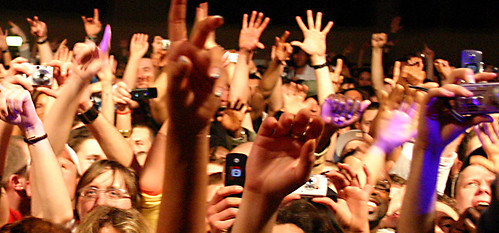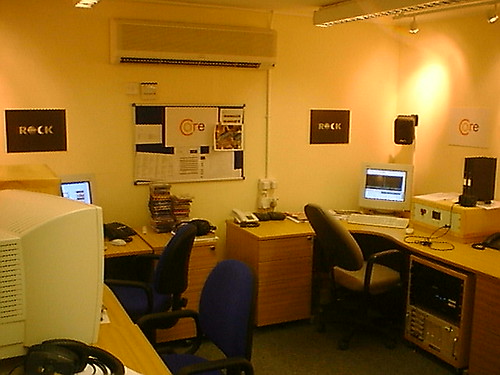George Lamb is the mid-morning presenter on 6 Music, one of the BBC’s Digital radio stations. 6 Music has a tendency to take itself, and its music, rather seriously. It was apparently born from (or heavily influenced by) the ashes of BBC Radio London when that station reinvented itself as a more news & current affairs station called BBC LDN. Indeed, the previous occupant of the 10am – 1pm slot on 6 Music, Gideon Coe, was a luminary of BBC Radio London and somewhat of a music guru. 6 Music is under the wing of Lesley Douglas, who’s main job is looking after BBC Radio 2.
George’s arrival certainly shook up 6 Music, and generated plenty of heated debate by the music loving listeners to the station. He’s suffered criticism like few other presenters have, and he’s borne it well. His show is best described as unique, and somewhat less reverential about music than some of the other 6 Music presenters.
So why is George Lamb potentially “the Saviour of Digital Radio”?
In many ways, for the same reason that Chris Moyles can claim to be “the saviour of Radio 1”. George invokes serious passion in people; love him or hate him, everyone has an opinion on him, and his fame spreads way beyond the 520,000 people who listen to 6 Music each week. Just this week, I grabbed an Arena magazine (for a surprisingly long flight to Sweden – who’d have thought it was nearly 3 hours from Bristol?), and there was an article entitled “Black Sheep” all about George. People are talking about George Lamb, and the radio station he’s on.
George Lamb is the best marketing 6 Music has got. And in turn, it’s the best marketing Digital Radio has had in years.
A lot of earlier marketing about Digital Radio was pretty functional. “Buy a radio and get more channels“. Unsurprisingly, the mention of individual stations was very vague, because nobody wanted to promote a competitor’s station. Audience levels across the board were small, and it was virtually impossible to buy a radio, so nobody wanted to invest in station specific marketing.
But now Digital Radio is maturing, it does make sense to start marketing stations, and what a great way to promote a station by employing brilliant new talent, and talent that invokes passionate discussion – good and bad. (Given a choice, I would much rather manage a difficult but brilliant presenter who invokes polarising feelings in his/her listeners, than someone easy, bland and unassuming).
6 Music aren’t the only station investing in presenters as marketing. Planet Rock (560,000 listeners per week) has had stars like Alice Cooper, Rick Wakeman and Gary Moore on its presenter lineup.
The cleverest way to continue to grow Digital Radio listening is to make it the home of great new talent.
For the next stage of Digital Radio’s growth, I don’t believe we need to spend millions of pounds on “above the line” marketing like billboards or bus-sides or TV. Word-of-mouth about great talent spreads through the Internet, through Facebook and Bebo and onwards, particularly if it is a bit niche and a bit hard to get hold of. And given the relatively low revenue levels on Digital Radio, this risk involved with trying out new people is way lower than it is on analogue.
Commercial Radio, for once, has a level(ish) playing field; as many people can listen to Commercial Digital radio (through DigitalOne, or the considerable coverage offered by the network of local digital multiplexes) as can hear the BBC. If Commercial Radio can start stations that can house great talent, and work the PR and the exposure right, then it stands to gain as much as the BBC. It just needs to get comfortable with the idea of working bigger in an industry that previously considered “big” to be Capital FM. (A previous home to Chris Moyles, along with a string of local commercial radio stations incidentally). That doesn’t overcome the massive funding difference between the BBC and Commercial Radio, and the BBC’s ability to offer radio presenters routes into TV, but Digital Radio has narrowed the gap.
The appointment of Tim Davie (who has a marketing background) to replace Jenny Abramsky as Director of BBC Audio and Music, could be the catalyst for the BBC to do more to promote its digital radio services. The BBC Trust noted in its recent annual report that awareness of BBC Digital Radio services (at 41%) is perceived to be low, and that surely is a cue for the corporation to start working harder and smarter at promoting the services it spends quite of lot of money making.
Lesley Douglas said at the Radio Festival that it was time to stop talking about the technology of Digital Radio and start talking about content, and by George, Mr Lamb is content to talk about.
Photo: Applause by svenwerk @ flickr
[UPDATE 23-Jul-2007]
My post about a controversial person seems to have generated quite a lot of controversy, judging by the comments (and this is the most commented post so far).
I just wanted to clarify two things about the original post:
- I am neither a fan nor not a fan of George Lamb. I’ve not heard enough of his show to make a judgement, and I rarely listen to 6 Music. I wasn’t intending to pass comment on George’s talent or lack of it. The reason I picked George was because I’d just read a big article (in a popular mainstream culture magazine) about him, and the digital radio station he worked on, and that’s a big deal for those of us who are tracking the development of digital radio globally. It’s a significant point in time to be able to say that digital radio stations have to got a point where the personalities on those stations can garner coverage and exposure for what they do on their radio shows. I hope more digital radio stations can use that to their advantage, and to the advantage of the medium as a whole.
- When I talk about preferring to manage difficult but talented personalities, I’m not referring to anyone in particular. I’m going back to when I used to be a programme controller (of both analogue and digital stations) and was working alongside, and for, other successful radio programmers. Managing a great talent who polarises opinion is very hard work, and can be immensely frustrating, but you have to believe that it’s the right thing to do. Managing personalities is very hard. By contrast, managing unassuming, safe, competent radio presenters is pretty simple, but it doesn’t make radio that makes people laugh, cry, amused, amazed or enraged. And if it’s not doing that, what’s the point?
So please forgive me for inadvertently straying onto the battlefield, and consider me limping off, tending my wounds. But I’m still glad that it’s a digital radio station that’s creating such controversy.

